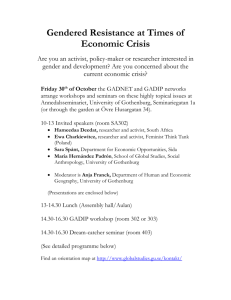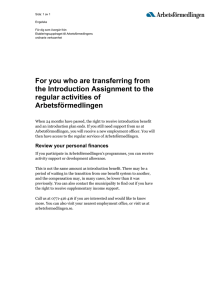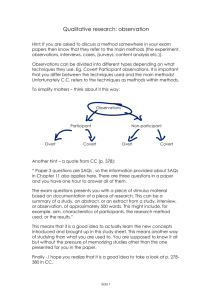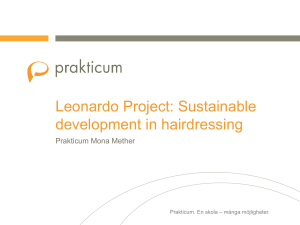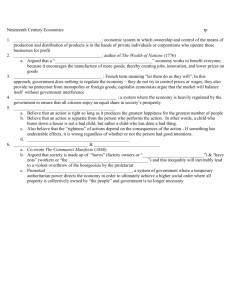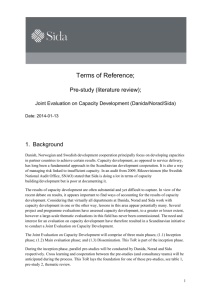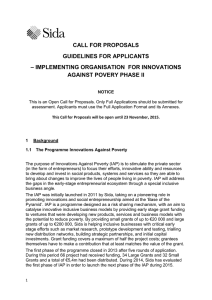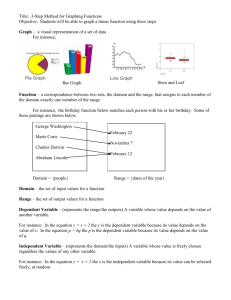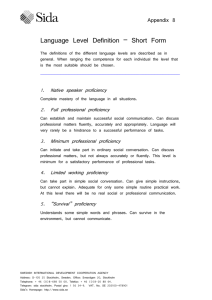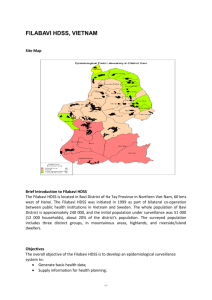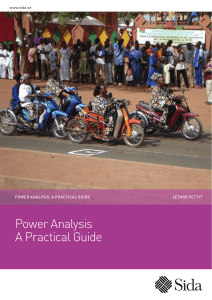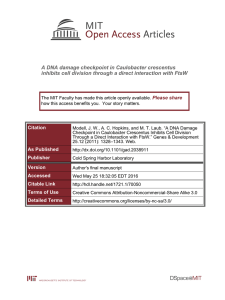report
advertisement
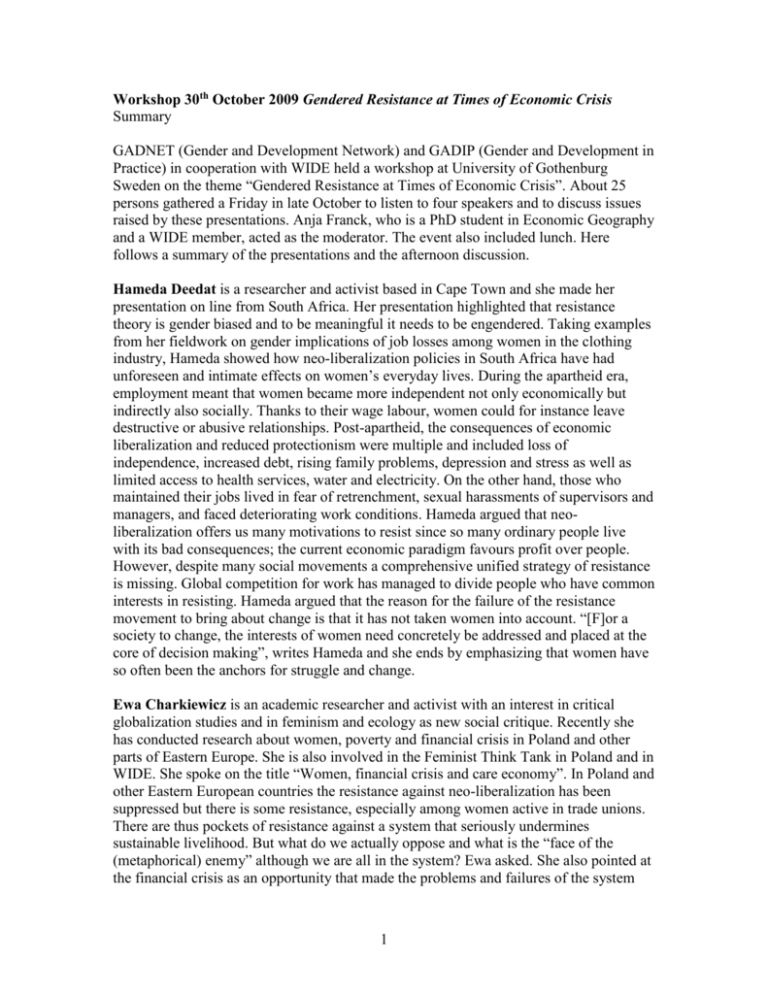
Workshop 30th October 2009 Gendered Resistance at Times of Economic Crisis Summary GADNET (Gender and Development Network) and GADIP (Gender and Development in Practice) in cooperation with WIDE held a workshop at University of Gothenburg Sweden on the theme “Gendered Resistance at Times of Economic Crisis”. About 25 persons gathered a Friday in late October to listen to four speakers and to discuss issues raised by these presentations. Anja Franck, who is a PhD student in Economic Geography and a WIDE member, acted as the moderator. The event also included lunch. Here follows a summary of the presentations and the afternoon discussion. Hameda Deedat is a researcher and activist based in Cape Town and she made her presentation on line from South Africa. Her presentation highlighted that resistance theory is gender biased and to be meaningful it needs to be engendered. Taking examples from her fieldwork on gender implications of job losses among women in the clothing industry, Hameda showed how neo-liberalization policies in South Africa have had unforeseen and intimate effects on women’s everyday lives. During the apartheid era, employment meant that women became more independent not only economically but indirectly also socially. Thanks to their wage labour, women could for instance leave destructive or abusive relationships. Post-apartheid, the consequences of economic liberalization and reduced protectionism were multiple and included loss of independence, increased debt, rising family problems, depression and stress as well as limited access to health services, water and electricity. On the other hand, those who maintained their jobs lived in fear of retrenchment, sexual harassments of supervisors and managers, and faced deteriorating work conditions. Hameda argued that neoliberalization offers us many motivations to resist since so many ordinary people live with its bad consequences; the current economic paradigm favours profit over people. However, despite many social movements a comprehensive unified strategy of resistance is missing. Global competition for work has managed to divide people who have common interests in resisting. Hameda argued that the reason for the failure of the resistance movement to bring about change is that it has not taken women into account. “[F]or a society to change, the interests of women need concretely be addressed and placed at the core of decision making”, writes Hameda and she ends by emphasizing that women have so often been the anchors for struggle and change. Ewa Charkiewicz is an academic researcher and activist with an interest in critical globalization studies and in feminism and ecology as new social critique. Recently she has conducted research about women, poverty and financial crisis in Poland and other parts of Eastern Europe. She is also involved in the Feminist Think Tank in Poland and in WIDE. She spoke on the title “Women, financial crisis and care economy”. In Poland and other Eastern European countries the resistance against neo-liberalization has been suppressed but there is some resistance, especially among women active in trade unions. There are thus pockets of resistance against a system that seriously undermines sustainable livelihood. But what do we actually oppose and what is the “face of the (metaphorical) enemy” although we are all in the system? Ewa asked. She also pointed at the financial crisis as an opportunity that made the problems and failures of the system 1 visible and that brought criticism from unexpected actors in the locus of the neo-liberal economy. Ewa underlined the importance of the care economy (i.e. the unpaid and often neglected work of primarily women to reproduce families and households) and of natural resources in the productive economy. It has even been argued by feminists that “ordinary people” are not indebted to banks but banks are rather indebted to them because of the care economy. For instance, if women would refuse care work, a state would not be able to function. There is thus a mutual dependence between different economies which is most often invisible and forgotten. By looking at connections between the productive economy and nature we can also better understand how the system works and what means we have to intervene. The use of computers for instance demand lots of natural resources as well as care work. As feminist scholars and as activists, we need to make clear what strategic interventions to use when resisting an economic system that damages our daily lives. Sara Spånt is a policy specialist, at team Market Development, the Department of Economic Opportunities, Sida, Stockholm. Her presentation focused on Sida’s ongoing and planned work for Women’s Economic Empowerment (WEE). Sida defines WEE as the process which enables women to make strategic life choices through, first, equal access to and control over critical economic resources and opportunities and, second, elimination of structural gender inequalities in the labour market (including a better sharing of paid and unpaid work between men and women). Sida’s work is divided into seven focus areas. The first area concentrates on building women’s human capital and capabilities. This is mostly done through support to education which should be for everyone and of high quality as to not reproduce pre-existing social inequalities. Vocational Education and Training programs (VET) should also be gender aware; for instance they should not be focusing on training women only for traditional female occupations or competencies. The second focus is on the redistribution of reproductive and unpaid care work. By infrastructure investments (such as water, energy and transport) women’s time spent on households’ chores may be reduced. In this area, public financing of child care has immediate payoffs. Thirdly, Sida works to equalize property rights since unequal access to land and housing blocks access to expansion and credit. Alternative and better approaches to land titling and rights can also benefit women. The fourth area is focusing on labour market rights with special attention to informal economy and agriculture and to female migrant and domestic workers’ rights. Labour market reforms should also recognize and work for the reconciliation of family and work obligations. Entrepreneurship and private sector development was the fifth area of concern that Sara spoke about. Sida here works for the availability of micro-credits and for entrepreneurship programs which are better suited for women. The sixth focus is on gender aware social protection which guarantees citizens’ access to their most basic means. Women’s reproduction should also be recognized for instance in maternity health care. The last area Sara talked about was gender and trade. Sida wants trade policies to integrate gender considerations in order to minimize the unintended negative gender impacts of structural reforms and to explicitly promote gender reforms. In sum, Sida concentrates on gender awareness and prioritizes some specific areas when trying to promote WEE. 2 Maria Padrón Hernández is a PhD student in social anthropology at School of Global Studies, University of Gothenburg. Her research is about everyday economies in Havana, Cuba. At the workshop, her presentation focused on the experiences and responses to a more or less constant economic crisis, using a broad definition of resistance which is more related to possibilities to cope than to protest openly. Maria described the Cuban economic context in which a fundamental problem is that state salaries are not enough to cover household needs for most. What people do is to diversify their income-generating activities by working in the informal and thus illegal sector or by the informal letting of valuable assets such as cars and phone lines. Since notions about the male breadwinner and female care-taker prevail in Cuba (despite an ideological and factual participation of women in wage-labour), women have more of an excuse not having a formal job. Men without formal employment are more often suspected of working illegally which is not only a legal problem but also a political one. Women without a job can claim to be housewives and thus escape from suspicions of being unemployed or acting in the informal sector. Maria argued that as a consequence of economic hardships people in Havana feel that they cannot live “a normal life”. Economic crisis is thus not only about difficulties to survive but also to lead a life that permits people to be “real persons” in the moral and social sense of the word. Those notions about real personhood are also gendered. In Cuba, concerns about lack of hygiene products and means to date create a sense of abnormality, indignity and dissatisfaction. Even though Cubans seldom have to go hungry, they have to forsake those things that they considered making life worth living. In sum, both responses to and experiences of economic crisis are gendered. Moreover, Maria argued that to fully understand the consequences of economic recession poverty should not be reduced to the un-fulfilment of basic biological needs but people’s own concerns and wants should also be taken into consideration. For the afternoon session, which was also headed by Anja Franck, some of the present researchers had prepared questions to open up the discussion, taking as point of departure the concern of the theme of the workshop in different geographical areas of the world. Edmé Domínguez spoke from a Latin American perspective, Ann Schlyter and Hauwa Mahdi from an African one while Anja Franck focused on the situation in South East Asia and Ewa Charkiewicz on the European context. Our discussion then came to concentrate on the concept resistance and how it is defined. What do we mean by resistance and why is it important to resist? Without reaching a consensus, we discussed resistance as survival versus open opposition, as collective oppression while individual freedom abounds, as an intended and recognized opposition as opposed to the unintended outcome of acts and practices. Within our networks we need to maintain a critical perspective but at the same time also think of the more practical implications of resistance. Does resistance matter and does it make a difference? It was suggested that resistance may be important to understand causes of subordination and to create a sense of empowerment while a focus on for instance citizenship rights can be more constructive in practice. Naila Kabeer, University of Sussex, who joined us by the end of the day underlined that the so called food crisis may be more important than the financial crisis for most people and that crisis may be an opportunity to talk about social protection and to criticize trade agreements. Nina Gren, GADIP 3
